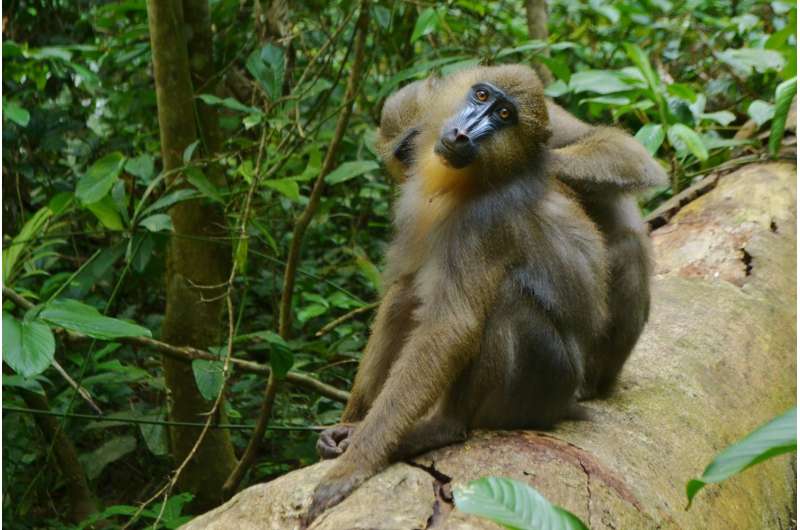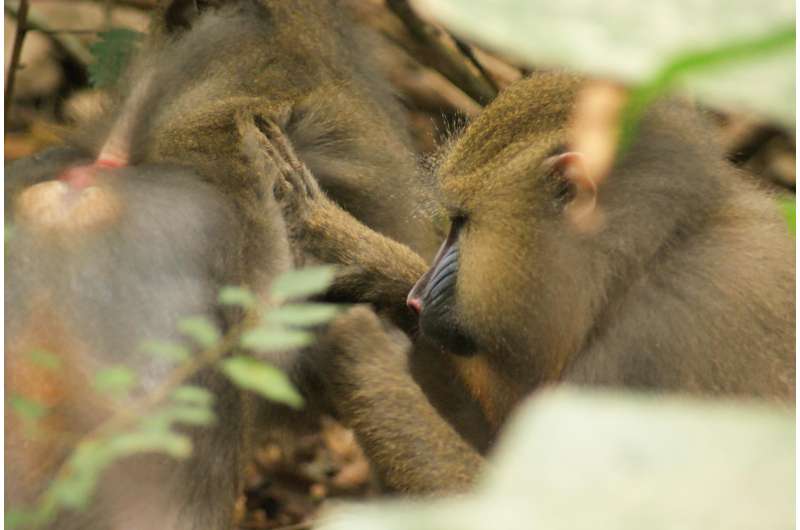Smell helps primates flee parasites

Researchers from the CNRS have discovered that mandrills use their sense of smell to avoid contamination by intestinal protozoans through contact with infected members of their group. Their work, published in Science Advances, shows that parasites shape the social behavior of these primates, leading them to develop a strategy of parasite avoidance through smell.
The Mandrillus Project was launched in 2012, in southern Gabon, to study the ecology of the world's sole population of wild mandrills habituated to human presence. Frequent grooming among these mandrills is undoubtedly a means of eliminating ectoparasites, but it also plays a major role in social cohesion—helping to soothe tensions after conflict, for example.
Mustering data from five years of field observation, the researchers demonstrated that mandrills harboring parasitic protozoans in their digestive tracts were less frequently groomed by their conspecifics than were healthy mandrills. Groomers especially avoided the perianal zone, which poses a high risk of contagion.
To pursue their investigations, the scientists conducted an experiment using antiparasitics. They captured infected mandrills, administered the antiparasitic drug, and returned the treated mandrills to their group. Now free of parasites, these primates once again enjoyed frequent grooming.
The research team next sought to determine whether olfactory communication could explain avoidance of infected conspecifics. First, chemical analyses showed that fecal odors differed between infected and healthy mandrills. Next the team conducted behavioral experiments under controlled conditions on 16 captive mandrills at a Gabonese research institute. The researchers collected fecal matter from mandrills at different times—while parasitized and when free of parasites—and rubbed it onto bamboo shoots. These shoots were then presented to captive mandrills. Curiously, the scientists noticed that the captive primates sniffed the bamboo set before them but actively avoided those shoots rubbed with infected feces. Such selective shunning elegantly demonstrates how olfactory communication may play a role in the behavioral and social avoidance of parasitic infection.

This research suggests that parasites, similarly to kinship ties and social rank, influence mandrill behavior by shaping social dynamics in their group. This study of the evolution of antiparasitic behavior is currently focused on the influence of parasites spread merely by contact. But it could expand its scope to include other mandrill pathogens with different routes of transmission, such as nematodes spread through contact with the environment or retroviruses spread from male to male by biting.
More information: Mandrills use olfaction to socially avoid parasitized conspecifics Clémence Poirotte, François Massol, Anaïs Herbert, Eric Willaume, Pacelle M. Bomo, Peter M. Kappeler, Marie J. E. Charpentier. Science Advances, 7 April 2017. advances.sciencemag.org/content/3/4/e1601721
Journal information: Science Advances
Provided by CNRS

















